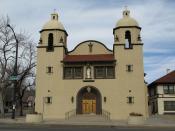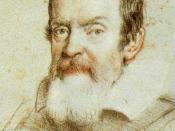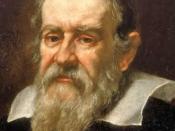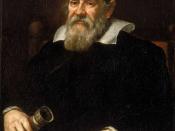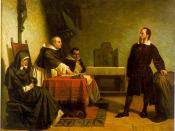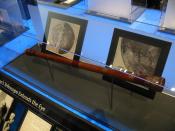Lawrence in his book Culture and Values A Survey of the Humanities, talked about the Baroque period "Throughout the seventeenth century; philosophy - like the visual arts - continued to extend and intensify ideas first developed in the Renaissance by pushing them to new extremes. With the spread of humanism the sixteenth century had seen a growing spirit of philosophical and scientific inquiry"(402). In fact, with the appearance of many talented philosophers and scientists like Galileo and Descartes. Additionally, it was the time for philosophy and science to show up because in Baroque time, they was no longer afraid of being got killed as the church did with the scientist and philosopher before.
One of the most famous physicians of all time is Galileo. The church was so afraid of him but they could not kill him because at Baroque time, the church did not kill people anymore, they tried to listen to the voice of people because it might help the church to strike back Protestant in what way.
Although Galileo did not get kill but he had been managed very tightly by the church. This thing make us a question, why the church so scared of him? Firstly, he was the one who point out the universal truth. William in his book Great Physicists, tell the story about Galileo when he tried to convince the people of Rome "He had one more world to conquer: Rome-that is, the Church. In 1611, Galileo proposed to the grand duke's secretary of state an official visit to Rome in which he would demonstrate his telescopes and impress the Vatican with the importance of his astronomical discoveries"(19). The purpose of this visit was to convince the people of Rome and the Pope that, the sun is the center of universal not the Earth as the Greek philosopher said. Through his telescope, "Galileo's telescope had revealed mountains and valleys on the Moon and spots on the Sun" (William, 20). His evidence was very strong but not enough to persuade the church. And when he proved that the Earth is not flat and can rotate by itself. He really got into trouble. According to Galileo, the Earth is round. His argument was opposite with the church ideas because the church usually remind the trader that they should not go so far in the sear because when they go to something called the limited boundary of the Earth, they might fall to somewhere at universal. Meanwhile, he also the philosopher who usually put the question mark that not only "why" but " how" and "what".
Other well known philosophy was Descartes who was very intelligent and smart." Often called the Father of Modern Philosophy"( Cunningham, 405). His saying was" I think, therefore I am". Despite the fact that the Catholic Church always convince people that we are created by god, our ideas, have been control by god and what the god say. He was not that kind of people, he assumed that do not believe in anything, only he can proved it. Although he was really got talented in philosophy field but he was Christianity. In other words, he believes in god because he did not want to get trouble with the church with his radical though. In mathematics, he also founded the equation in algebra that we are using today.
"For all the importance of religion, the seventeenth century was also marked by significant development in philosophy and science. Galileo, the father of modern physics, revolutionized astronomy by proving Copernicus clams of the previous century correct. Thinkers like Descartes and Hobbes, instead of accepting official church teaching, try to examine the problems of human existence by their own intellectual approaches"( Cunningham, 409). In the early Renaissance till now, Baroque stage, many philosopher and scientists had been kill when they say something against the church or opposite with the traditional thinking of society. Luckily, Baroque stage was the good time for scientists and philosophers like Galileo and Descartes to stand up and show up their humanism.
Worked Cited:Lawrence Cunningham and John Reich, Culture and Values A Survey of the Humanities, Thomson Wadsworth, 2005William H. Cropper, The Life and Times of Leading Physicists from Galileo to Hawking, Oxford University Press, 2001
